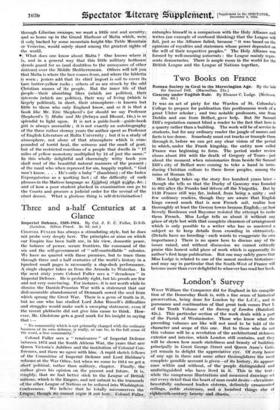Two Boocs on France
Roman Society is Gaul in the Merovingian Agii. By the late Sir Samuel Dill. (Macmillan. 218.) Gascony under English Rule'. By Eleanor C. Lodge. , (Methuen. 10s. 6d.) - - IT was an act of piety for the Warden of St. Columba's College to prepare for publication this posthumous work of a great Ulster scholar ; and two notable professors, one from DUblin and one from Belfast, gave help. But Sir Samuel Dill's reputation cannot blind a reader to the fact that here is a quarry rather than a btiilding. The work will be of service to Students, but for any ordinary reader the jungle of names and facts is too dense. Somebody must cut tracks or trample them through it, before we can get any clear vision of the period in which, under the Frank kingship, the entity now called France was beginning to form. The period under review closes about 594 with the death of Gregory of Tours—just about the moinent.when missionaries from beside Sir Samuel Dill's city of Belfast were coming to take a hand in intro- ducing Christian culture to theie fierce- peoples, among the ruins, of Roman life.
Miss LOdge takes up the story five hundred years later--.. though she tells us that the Duchy of Gascony was founded in 602 aftet the Franks had'driven off the Visigoths. But by 1150 France still was far, indeed, from being a unity ; and few ordinary readers; -though they are aware that English kings owned much that is now French soil, realize how thoroughly at least the Gaston towns peeaFinEnglislit fiercely Bordeaux and Bayonne resisted the attempt to make them French. Miss Lodge tells us ahont it Withinit • any grOce of style but with thOt complete clearness-of arrangement which is only possible to a writer who has so mastered a subject as to keep details from crowding in obtrusively. (Details have no breeding-leach wants to exaggerate its own importance.) There is no space here to discuss any of the issues raised, and without discussion we cannot critically praise this honest solid piece of work which is aPparently its author's first large publication. But one may safely guess that Miss Lodge is related to one of the sanest modern historians ; and may say in particular that the South-West of France will become more than ever delightful to whoever has read her book.






























































 Previous page
Previous page